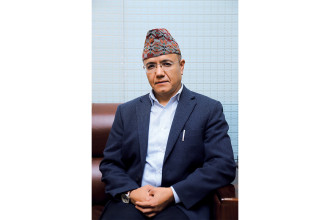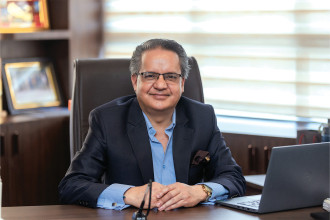-1709878940.jpg)
Manish K Khemka
Executive Director, BLC Holdings
Manish K Khemka is the Executive Director of BLC Holdings, one of Nepal’s leading business conglomerates. His journey weaves through a tapestry of industries including healthcare, education, FMCG, banking and finance, beverages, agriculture and packaging. His tenure has seen the inception and success of pioneering ventures and leadership of multifaceted teams. As the Chairman of Global Equity Funds, he spearheads venture capital and private equity initiatives, chartering new territories in Nepal’s financial landscape.
Khemka is a Harvard Business School graduate. His academic journey has endowed him with a profound grasp of global leadership, strategic management and financial acumen. Recently, he further honed his expertise through a leadership programme in medicine at Harvard Medical School, strengthening his ability to synergise business with healthcare innovations in Nepal.
He also represents the Confederation of Nepalese Industries (CNI) at the National Planning Commission’s nutritional committee and also presides over the CNI’s health council. His affiliations extend to the NYEF, Harvard Club of India, Harvard Association of Nepal, and Lions Club of Kathmandu, among others.
Beyond his corporate pursuits, he finds solace and creative expression in fashion, horology and sports. As a passionate poet and writer, he has bared his soul in his anthology, ‘Rubaru’, connecting with readers who share his zeal for the written word. In this edition of Business 360, Khemka speaks about various aspects of leadership.
How do you define leadership?
“Leaders become great, not because of their power, but because of their ability to empower others”- John C Maxwell. In this spirit, I perceive leadership as inspiring and influencing others towards a common goal. It involves setting a clear vision, motivating and empowering team members, and making decisions that drive the organisation forward.
Is leadership inborn or acquired?
I believe that while some people may have natural inclinations towards leadership, it is primarily an acquired skill. Through experience, learning and personal development, individuals can cultivate the qualities and abilities needed to become influential leaders.
Is there any leader that you look up to?
Reflecting on the words of Mahatma Gandhi, “A man is but the product of his thoughts. What he thinks, he becomes.” Indian Prime Minister Sri Narendra Modi’s leadership also resonates with this principle. His visionary outlook and commitment to transforming India through decisive and inclusive initiatives are a powerful embodiment of transformative thoughts and action. Modi’s journey from a humble beginning to the pinnacle of leadership underscores the profound impact of determination, strategic thought and a people-centric approach to governance. I take up these learnings and it has assisted me in my leadership journey.
What are the effective qualities of a leader?
Echoing Simon Sinek’s words, “Leadership is not about being in charge. It is about taking care of those in your charge.” I believe influential leaders demonstrate strong communication skills, empathy, resilience, strategic foresight, the ability to empower others, and a commitment to integrity and ethical behaviour.
How important is a team for a leader?
As Michael Jordan, a paragon of teamwork and excellence, once said, “Talent wins games, but teamwork and intelligence win the championship”. A leader’s success is symbiotically tied to their team’s cohesion and collective efforts. A strong team provides diverse perspectives, expertise, and support necessary for achieving shared objectives.
How do you view leadership in the present and future generations?
Leadership will continue to evolve in the present and future generations, with increasing emphasis on adaptability, inclusivity and sagacity to navigate complex global challenges, including technological advancements and sustainability concerns.
How does one influence people?
Drawing from Dale Carnegie’s wisdom, “You can make more friends in two months by becoming interested in other people than you can in two years by trying to get other people interested in you.” Influence stems from genuine engagement with others, exemplary conduct, fostering trust, and aligning with the motivations and aspirations of those around you.
One incident that tested your leadership and how you handled that.
Leading in Nepal often involves navigating the turbulent waters of policy inconsistency, with shifts in governance frequently prompting strategic recalibrations. My leadership has been tested and strengthened by these challenges many times, fostering a culture of resilience and adaptability within me and my team.
Have you faced any failure, and what did you learn from it?
Early in my career, I started a business initiative that did not yield the expected results. This experience taught me the importance of thorough research, astute risk management, and the indispensable value of embracing failure as a stepping stone to success.
What aspects of your personality have helped you serve various roles?
In the words of Dwight D Eisenhower, “The supreme quality for leadership is unquestionably integrity. Without it, no real success is possible.” My integrity, coupled with a strong work ethic, resilience, and an unquenchable thirst for learning, has been the foundation of my success in various leadership roles. These traits have enabled me to navigate diverse sectors’ complexities and lead with conviction and confidence.





-(1)-1752214965.jpg)